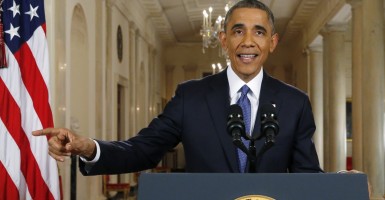Nearly nine out of 10 Americans skipped President Barack Obama’s State of the Union address. According to Nielsen, only 31.7 million tuned in on Jan. 20 -the second lowest viewership attracted by the event in 15 years.
Yet it’s safe to assume that many, if not most, world leaders were quite curious to hear what the leader of the free world had to say, and our nation’s friends and allies must have turned from the screen deeply disappointed that they barely merited a mention. The speech’s section on America’s place in the world was all too brief.
That’s a shame, because friendly nations are eager for closer dialog with the White House. We know, because we have been on what Hillary Clinton would call a “listening tour,” meeting with officials from allied and partnering nations to learn of their concerns and what they would like to see from the United States.
They told us the same things they’ve been telling this White House for months. Their topline message: Our common values as free nations are being threatened.
They see these threats as coming not only from Russian President Vladimir Putin’s aggression in Ukraine and from terrorist attacks like those in Paris, but from inaction by the United States. They are puzzled and concerned about Washington’s muted, tentative responses to such provocations. For example, they struggle to understand why, if U.S. leaders believe an Authorization to Use Military Force is important, there is still no sense of urgency to complete one, months after the conflict in Iraq reignited.
There is widespread skepticism that “leading from behind” is working. Even many who applauded Obama’s fresh approach to foreign affairs, embracing direct negotiations with some of the world’s most contentious powers, are disappointed. The Russian reset is a case in point. There is no confidence in the administration’s ability to manage Putin. Our friends may not agree on how best to deal with Putin and with other thugs on the world stage, but their belief is unanimous that ignoring or appeasing them is not the right answer.
Most deeply, many of our friends miss hearing a strong voice of freedom from Washington – a voice that pushes back against the deluge of propaganda and disinformation pouring from Moscow and other locations. They fret over the apparent lack of concern over traditional human rights issues. Worse, there is little consensus on how to wage the war of ideas against Islamism. All they do agree on is that the alliance of freedom is underperforming; that the international bully pulpit sits vacant.
Our friends also fret about American hard power. Forward presence and strong, consistent leadership are what made America desirable as an ally in the first place, and these remain essential elements of American appeal. The idea that the so-called Asian pivot might mean we are turning away from longstanding allies causes many of them to cringe.
On no topic did we hear more dismay than over the U.S. failure to adopt a free-market energy policy. From exporting natural gas to sharing energy extraction technology, it’s the best approach for security, the environment and economic growth – a “win-win-win,” according to our friends.
Finally, the world craves U.S. leadership on trade. Trade deals are more than economic bargains. They are politically vital symbols that demonstrate American ties to their region are strengthening, rather than atrophying. On the other hand, they understand that for there to be strong support from Congress, the president can’t deliver just any trade deal; it must be a deal that actually promotes free trade and helps liberalize markets.
America has many partners in its pursuit of global peace, freedom and prosperity. They’ve been sending these messages to Washington for quite some time now. Doubtless, they would have appreciated a line in the president’s speech that acknowledged, simply, that the message is received.
Unfortunately, no such line was there. Our friends and allies still need an assurance that, somewhere in Washington, there are ears that have heard their concerns and understand what they need from America in today’s world.
Originally appeared in Real Clear Politics.
























